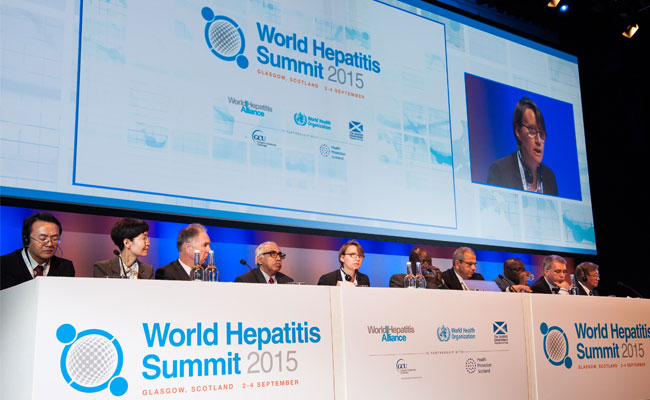
The
first-ever World Hepatitis Summit held in Glasgow, Scotland in which over 600
patients, policy makers, civil society, physicians, public health specialists
and other key stakeholders participated.
The
summit, co-sponsored by WHO and the World Hepatitis Alliance, and hosted in
Glasgow by the Scottish Government on 2-4 September 2015, was the first
high-level global meeting to focus specifically on hepatitis, attracting
delegates from more than 60 countries. The aim was to help countries enhance
action to prevent viral hepatitis infection and ensure that people who are
infected are diagnosed and offered treatment.
We know how to prevent viral
hepatitis, we have a safe and effective vaccine for hepatitis B, and we now
have medicines that can cure people with hepatitis C and control hepatitis B
infection,” said Dr Gottfried Hirnschall, Director of the WHO’s Global
Hepatitis Programme. “Yet access to diagnosis and treatment is still lacking or
inaccessible in many parts of the world. This summit was a wake-up call to
build momentum to prevent, diagnose, treat - and eventually eliminate viral
hepatitis as a public health problem.”
Around 400 million people are
currently living with viral hepatitis, and the disease claims an estimated 1.45
million lives each year, making it one of the world’s leading causes of death.
Hepatitis B and C together cause approximately 80% of all liver cancer deaths,
yet most people living with chronic viral hepatitis are unaware of their
infection.
“This summit was about empowering
countries to take the practical steps needed at a national level. It brought
here to Scotland patients’ groups and civil society from across the world to
support countries in doing this. We can eliminate viral hepatitis as a major
global killer but we must all work together to make that vision a reality,”
said Charles Gore, President of the World Hepatitis Alliance.
WHO, officially launched manual
for the development and assessment of national viral hepatitis plans in the
mentioned summit and the draft of WHO Global Health Sector Strategy on Viral
Hepatitis, which sets targets for 2030, was thoroughly discussed by Policymakers
and other key stakeholders. The targets mentioned in WHO draft include a 90%
reduction in new cases of chronic hepatitis B and C, a 65% reduction in
hepatitis B and C deaths, and treatment of 80% of eligible people with chronic
hepatitis B and C infections.
Please click here to view or
download WHO manual for the development and assessment of national viral
hepatitis plans.
Dr. Shima Naghavi, Director of
International Affairs